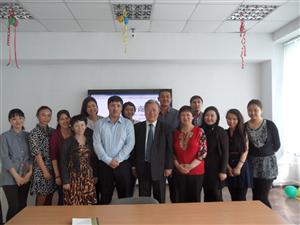
Kazakh National University named after al-Farabi became one of the most prestigious educational and research institutions in the world, which cooperates with the most well-known scientists. Today, this policy is beginning to bear fruit. From April 20th, professor of Beijing University, one of the most influential teachers of the Faculty of History, Professor Wang Xiao Fu lectures to the undergraduates and doctorates of the Department of Chinese Studies of the Faculty of Oriental Studies. This happens for the first time in the history of the university.
Beijing University of China ranks first among universities around the world, and is one of the 15 unique institutions.
The university library has more than 8 million books in and 10 thousand Chinese and foreign magazines. The university provides books and reading rooms with a total area of 50 thousand square meters. Beijing University has one of the largest libraries in the Asian continent.
At the same time, a great number of foreign students are studying at the university, to be exact there are more than two thousand foreign students.
Professor Wang Xiao Fu, thanks to his hard work, education and skills, is an internationally recognized scientist. He gives lectures in the United States, Japan, South Korea, France, Germany and Egypt and lectures at universities in developed countries.
Professor Wang Xiao Fu for 4 weeks will give lectures and hold seminars within the prefabricated program on the topic: "The attitude of medieval China and Central Asia". Where complete information about China's Sui, Tang dynasties and Turkish Khanate beginning from the development of Chinese society and culture, Turkish culture, the influence of Chinese culture, relations between Chinese and the Central Asian countries, "Great Silk Road" processes, as well as a wide range of trade between East and West is given. And out of lectures he will provide scientific advice for undergraduates and doctorates dissertation about their work.
Department of Chinese Studies makes many more contributions for cooperation with other international universities. And this is important not only for the university and the faculty, but for a whole Oriental countries and its impact on the development of science.